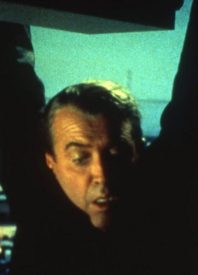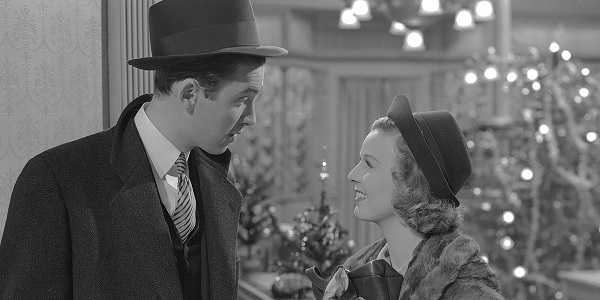
Call Me Jimmy: The Films of Jimmy Stewart started at TIFF Cinematheque more than a week ago. Part of that retrospective is Frank Borzage’s The Mortal Storm. Here he plays Martin Breitner, a German university student whose friendships fall apart after the country elects Adolf Hitler as its Chancellor. One of these ‘friends’, Fritz Marberg (Robert Young), asks Martin the unthinkable. To commit, body and soul, all 6 foot 3 of him, to the Party. It’s easy for Stewart’s characters to do the right thing and say no to such a commitment. I’d like to think that that’s equally easy for most members of my generation – don’t be a racist, don’t be irresponsible. But I wrote this piece the same day that the Richmond gun rally happened, so what do I know?
These decisions seem simple for Stewart’s younger characters. Their propensity for moral righteousness even appear in surprising places. Ernst Lubitsch’s The Shop around the Corner gives him and his Mortal co-star Margaret Sullivan a second and better chance at portraying Europeans. This time around they’re playing competing salespeople who inadvertently catfish each other. This seems like a low stakes film, but Stewart makes his character Alfred Kralik’s search for a romantic utopia so worthy. That’s especially true since his questions about it revolve around the idea that love isn’t enough to keep two people alive.
Stewart’s romantic films – and yes, there’s some of them – are battlegrounds between realism and idealism. In Frank Capra’s You Can’t Take It With You, he plays Tony Kirby. He’s a man who eventually learns to inject bits of anarchy in his life as he courts Alice Sycamore (Jean Arthur). She belongs to a kooky family who don’t want to pay their taxes. My assessment of him being always right feels simplistic here. And we can say the same to those who say that all old films are simple and thus bad.
The simple call to be right seems to stay the same for Jimmy Stewart’s characters. But that becomes more complex as he grows older. He worked with Alfred Hitchcock in several films. Mister All America and the Master of Suspense make for an unlikely duo specifically because of the way the latter uses him. Hitchcock puts him in a lot of crime scenes like ones in The Man Who Knew Too Much or Vertigo. And it’s always interesting to watch what he’ll do in those situations, whether or not to stop the cycle of violence or perpetuate it.
Stewart’s filmography guide us through morally complex circumstances, like the one in Otto Preminger’s Anatomy of a Murder. There, his attorney character Paul Biegler predates big personality lawyers like Racehorse Haines. He shouldn’t be working for murderers like Lt. Manion (Ben Gazzara). But he has an ability to make mitigating circumstances appear, defending a man more defensible than he appears. Films these days, then, seem to miss the presence of a moral compass like Stewart.
Stewart knew what’s right or can make what’s wrong look right. But slivers of those qualities exist in some leading men today. The most likely candidate to replace him is Tom Hanks who, for three decades now, is basically America’s dad. I also see the same quality in Chris Pine. Underestimate him, but Pine bears the endurance tests and quandaries in both the Star Trek and Wonder Woman reboots. You can watch those two actors but it’s equally worthwhile to see the man who probably influenced them.
For more information on Call Me Jimmy: The Films of James Stewart go to https://tiff.net/calendar?series=jimmy-stewart&list.


